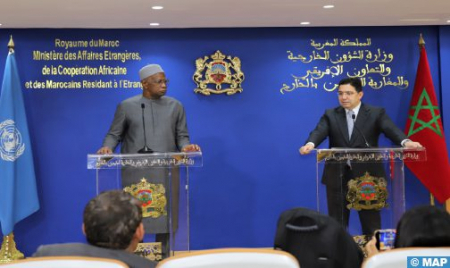Libyan Crisis: FM Reaffirms Morocco’s Support for Efforts of UNSG Special Representative
Minister of Foreign Affairs, African Cooperation and Moroccan Expatriates, Nasser Bourita, reiterated on Monday in Rabat Morocco’s support for the efforts of the UN Secretary General’s special representative in Libya, Abdoulaye Bathily, to find a solution to the crisis in Libya, affirming the Kingdom’s readiness to work with him permanently within the framework of his missions. In a joint press conference after talks with the UN representative, Bourita stated that “the meeting was an opportunity to discuss the evolution of the situation in Libya, the progress made in some areas and the difficulties that still exist on the road to the solution of the Libyan crisis, as well as to recall the basics of the Moroccan position on this issue, represented by four key points.” These points, he explained, are represented by the fact that Morocco stands with the national unity and territorial sovereignty of Libya and supports a solution within this framework. The Kingdom also supports a peaceful Libyan solution to the Libyan crisis far from any outside interference and any initiative to impose military solutions in this country, the minister continued, adding that Morocco, as part of its support for the Libyan solution, is against any foreign interference in Libya and opposes making Libya “an arena for diplomatic disputes.” On the third point, Bourita stressed that the resolution of this crisis can only come through a Libyan solution with international support, noting that the essential role of the UN in achieving a solution occurs in this context. On the fourth point, the minister pointed out that the Kingdom distinguishes between two issues, namely the question of legitimacy and the management of the transition period. On the other hand, Bourita regretted the obstacles still facing the preparation of these elections and expressed his desire to overcome these difficulties thanks to the wisdom of the Libyans and the international efforts of all parties to reach a consensus and hold elections as soon as possible. As for the management of the transitional period, Bourita explained that the management of this stage must be consensual, through the institutions that will work on the preparation of the elections, both the executive and the legislature. The Kingdom affirms that there is a transitional phase and that the issue of legitimacy will be resolved through elections, just as there are institutions to work with from this point of view, he summed up, adding that Morocco is continuing its efforts alongside the United Nations to achieve this solution.

